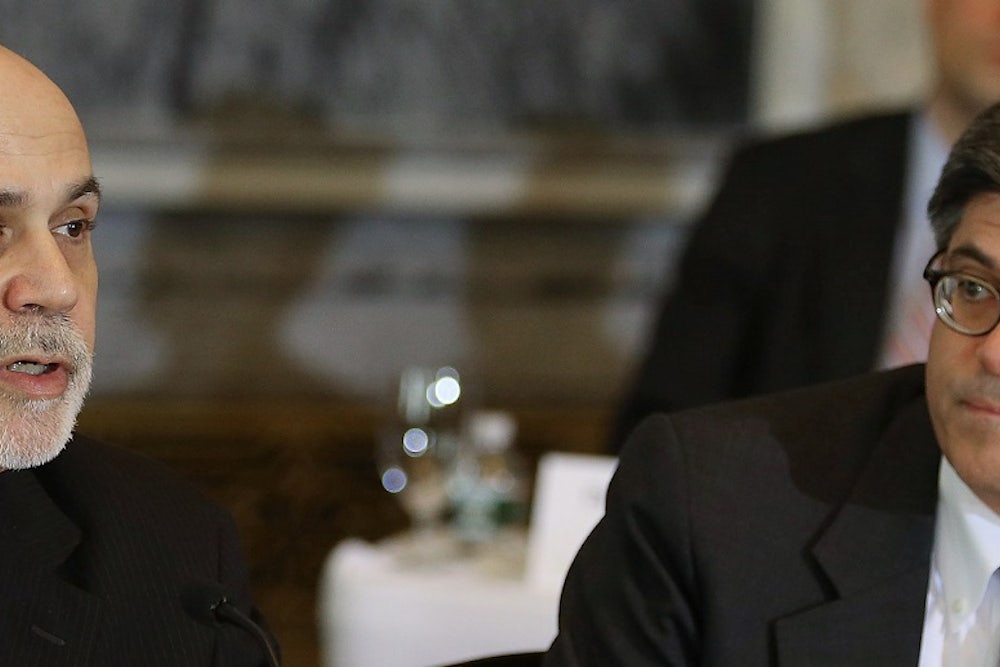The Treasury Department announced late last week that the budget deficit for fiscal 2013 was $680 billion—$409 billion lower than it was in 2012. The Obama Administration and its allies celebrated: “We are moving in the right direction,” a triumphant Treasury Secretary Jack Lew said in a statement. But these budget numbers are no cause for good cheer. If anything, they are a reminder of just how backwards our fiscal priorities have become.
Yes, the budget deficit is falling at a remarkable pace, as you can see from this graph by Evan Soltas:

And, at most times, smaller deficits are better than larger deficits. But this is not one of those times. Red ink flowed by the barrel after Obama took office, mostly because the government was spending madly to stop the country from falling into the next Great Depression. And according to the vast majority of economists, that was absolutely, positively the right thing to do: The economy would have kept shrinking if the government hadn’t pumped so much money into it. The deficit is falling now partly because the economy has started to recover, but partly because recent spending agreements, including the infamous budget sequestration, have reduced government spending. That’s slowing growth. The Congressional Budget Office estimated that austerity reduced economic growth by 1.5 percent last year and will do so again this year, although to a lesser extent thanks to the Murray-Ryan budget deal. (The Murray-Ryan agreement restored some spending that budget sequestration had cut.)
Some economists have argued that critics overestimate the effects of austerity policies—had Congress supported more deficit spending, these economists say, then the Federal Reserve would simply have tightened monetary policy in response. There’s some truth here. The Fed’s use of tools like “quantitative easing” is necessary because of the slow recovery, much of it the result of spending cuts that came from Capitol Hill. But Fed officials have also made clear that they cannot fully offset the drag of fiscal policy, because of institutional constraints and uncertainty about how their actions will play out. Last year, then-Fed Chairman Ben Bernanke chastised Congress for the spending cuts and the subsequent weak recovery. Even if the Fed had used higher government spending as a cue to intervene a little less, it would not have tightened policy so much that we would have the same weak growth as we see today. The combined effect of higher fiscal deficits and tighter monetary policy would have been higher growth.
And don’t forget: Growth isn’t some abstract concept. It’s commerce, wages, and employment for everyday Americans. Thus, at least for the time being, the real economic choice is between a higher deficit and more jobs, on the one hand, or a lower deficit and fewer jobs, on the other. We’re getting the latter.
Of course, part of the problem is that most Americans don’t understand the linkage between spending and growth during times of slow growth. One reason is that they keep hearing—from debt-focused groups like the Concord Coalition and most of the Republican Party—that lower deficits (or, at least, reduced spending) will make the economy grow faster. That runs counter to the consensus of most economists—and, as Paul Krugman keeps pointing out, counter to the recent experiences abroad. The myths persist anyway.
The country does still have a problem with its ability to pay bills in the long run. Current projections suggest that deficits will start rising within a few years, then continue growing after that—a function, largely, of higher spending on health care programs. But the magnitude of that threat is unclear, given the recent and substantial slow-down in health care costs. Further addressing that requires reforming programs like Medicare and Medicaid and raising taxes, not restraining spending on “discretionary” domestic programs—everything from housing vouchers to infrastructure—as recent spending agreements have.
It would be nice if the low deficit gave lawmakers “breathing room” to enact new spending, as Patty Murray, the Democratic Senator who chairs the budget committee, put it in a memo to her Democratic colleagues last Thursday. But that seems unlikely—which is why, like Lew, she celebrated the deficit reduction that Congress has achieved in the past few years. It might be smart politics. It’s not smart policy.
